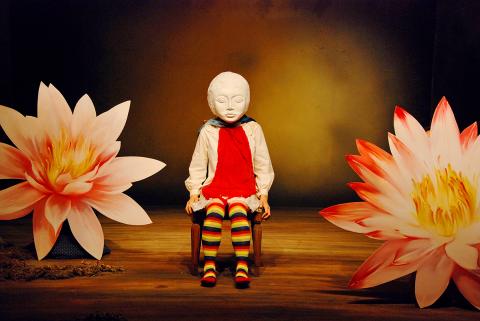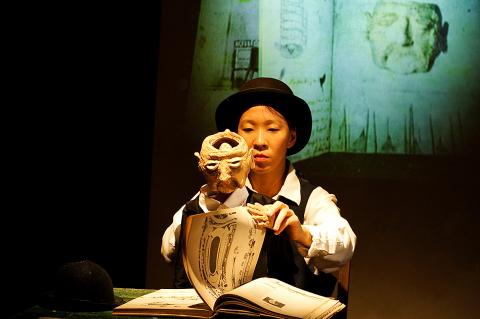Sometimes the best birthday parties are the ones you throw yourself.
Taipei-based Riverbed Theatre (河床劇團) is celebrating its 20th anniversary, with a gallery exhibition at the Eslite Bookstore in Taipei’s Xinyi District (信義), which opened earlier this month, and three days of a new production, Dream Makers: Subconscious Theatre — Riverbed Theatre’s 20th Anniversary (造夢者:潛意識劇場—河床劇團20年), next weekend.
The company’s image-based, “Total Theater” productions, more than 40 in all, have blurred the boundaries between visual and performing arts, creating productions largely unhindered by text or even linear narrative.

Photo courtesy of Riverbed Theatre
Some shows have been inspired by the lives and/or works of famed artists from a variety of fields (Belgian surrealist Rene Magritte, US theater director Robert Wilson, US film director David Lynch, Albert Einstein, Japanese artist Yayoi Kusama) and events such as the Apollo 11 mission or Richard Wagner’s Das Rheingold. Others have sprung from the fertile, perhaps even fevered, dreams of artistic director Craig Quintero and his colleagues.
Riverbed’s painterly designs, sets featuring multiple hidden doors and exits, and its surreal imagery envelope audiences in dreamscapes that are filled with familiar objects yet often prove otherworldly, if not disturbing.
The troupe has developed a reputation for quality over quantity, preferring smaller venues such as the Taipei Artist Village and National Experimental Theater, or specially built environments for audiences ranging from two dozen to just one person, as with its “Just For You” productions set in hotel rooms and museums in Taipei and Tainan. It has also taken its shows on the road to festivals in Asia and Europe, such as the OFF d’Avignon.

Photo courtesy of Riverbed Theatre
The troupe staged its first show, Burnt Rice, at the Dunhua Eslite Art Space in 1998, so it is fitting it has returned to an Eslite outlet for its birthday celebration.
The “Dream Makers” exhibition is two-fold. While it features paintings, sculptures and video works by troupe members and collaborators, including Quinterro, Carl Johnson, Joyce Ho (何采柔), Su Hui-yu (蘇匯宇), Hsu Yin-ling (許尹齡), Hung Hung (鴻鴻) and Hsia Yu (夏宇), it is also a workshop where the set and props for next week’s shows are being built and painted.
The public is encouraged to participate in the set building process.
As for the show itself, the company says Dream Makers is “a performative meditation on the beauty and sorrow of living, on the fragile impermanence of life.”
“We are fascinated by our body, by the familiar yet strange vehicle that we inhabit. It is us, but at the same time it shifts and changes in ways beyond our control,” it says.
While that sounds maddeningly vague, it perfectly encapsulates Riverbed. The company’s shows have always been difficult to describe in advance, because they are made to be seen and experienced on an individual, not collective level.
While the shows can tap a shared subconsious in the form of cultural, social or visual references, each audience member sees and filters a Riverbed production through their own conciousness and imagination.
Twenty years is an admirable achievement, and Riverbed is a company certainly worth celebrating — whether by wielding a paintbrush or buying a ticket to next weekend’s shows.

That US assistance was a model for Taiwan’s spectacular development success was early recognized by policymakers and analysts. In a report to the US Congress for the fiscal year 1962, former President John F. Kennedy noted Taiwan’s “rapid economic growth,” was “producing a substantial net gain in living.” Kennedy had a stake in Taiwan’s achievements and the US’ official development assistance (ODA) in general: In September 1961, his entreaty to make the 1960s a “decade of development,” and an accompanying proposal for dedicated legislation to this end, had been formalized by congressional passage of the Foreign Assistance Act. Two

March 31 to April 6 On May 13, 1950, National Taiwan University Hospital otolaryngologist Su You-peng (蘇友鵬) was summoned to the director’s office. He thought someone had complained about him practicing the violin at night, but when he entered the room, he knew something was terribly wrong. He saw several burly men who appeared to be government secret agents, and three other resident doctors: internist Hsu Chiang (許強), dermatologist Hu Pao-chen (胡寶珍) and ophthalmologist Hu Hsin-lin (胡鑫麟). They were handcuffed, herded onto two jeeps and taken to the Secrecy Bureau (保密局) for questioning. Su was still in his doctor’s robes at

Last week the Democratic Progressive Party (DPP) said that the budget cuts voted for by the China-aligned parties in the legislature, are intended to force the DPP to hike electricity rates. The public would then blame it for the rate hike. It’s fairly clear that the first part of that is correct. Slashing the budget of state-run Taiwan Power Co (Taipower, 台電) is a move intended to cause discontent with the DPP when electricity rates go up. Taipower’s debt, NT$422.9 billion (US$12.78 billion), is one of the numerous permanent crises created by the nation’s construction-industrial state and the developmentalist mentality it

Experts say that the devastating earthquake in Myanmar on Friday was likely the strongest to hit the country in decades, with disaster modeling suggesting thousands could be dead. Automatic assessments from the US Geological Survey (USGS) said the shallow 7.7-magnitude quake northwest of the central Myanmar city of Sagaing triggered a red alert for shaking-related fatalities and economic losses. “High casualties and extensive damage are probable and the disaster is likely widespread,” it said, locating the epicentre near the central Myanmar city of Mandalay, home to more than a million people. Myanmar’s ruling junta said on Saturday morning that the number killed had